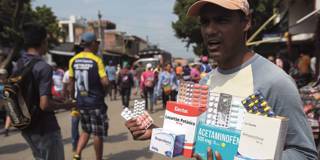Now that COVID-19 has illustrated the destruction that can be wrought by a single virus, there is no longer any excuse for delay in tackling the growing threat posed by antimicrobial resistance. There is still time to prevent a worst-case scenario, but the window is closing fast.
BOSTON – After over a year of pandemic, there is no shortage of “what-if” questions one could pose. What if we had started out with better surveillance and data sharing? What if governments and international health agencies had acted differently? We cannot turn back the clock, but we can and must consider the lessons learned, so that we can apply them to the next great global health challenge: antimicrobial resistance (AMR).
Around the world, hospitals are reporting more and more drug-resistant infections, and we are reaching the point where we no longer will be able to control the steady rise in cases. The widespread and unnecessary use of antibiotics in livestock production has created a massive incubator for new AMR bugs, while major pharmaceutical companies have abandoned the pursuit of new therapies to combat drug resistance. And, completing the perfect storm, the lack of regulation in most countries has fueled overuse of antibiotics in health-care settings.
The problem is most acute in low- and middle-income countries (LMICs). The COVID-19 pandemic has shown us that public-health crises have vastly unequal effects across socioeconomic groups, both within and between countries. From New York to New Delhi, marginalized and disadvantaged communities have borne the brunt of the pandemic and its economic fallout, and it is they who will suffer disproportionately from AMR.

BOSTON – After over a year of pandemic, there is no shortage of “what-if” questions one could pose. What if we had started out with better surveillance and data sharing? What if governments and international health agencies had acted differently? We cannot turn back the clock, but we can and must consider the lessons learned, so that we can apply them to the next great global health challenge: antimicrobial resistance (AMR).
Around the world, hospitals are reporting more and more drug-resistant infections, and we are reaching the point where we no longer will be able to control the steady rise in cases. The widespread and unnecessary use of antibiotics in livestock production has created a massive incubator for new AMR bugs, while major pharmaceutical companies have abandoned the pursuit of new therapies to combat drug resistance. And, completing the perfect storm, the lack of regulation in most countries has fueled overuse of antibiotics in health-care settings.
The problem is most acute in low- and middle-income countries (LMICs). The COVID-19 pandemic has shown us that public-health crises have vastly unequal effects across socioeconomic groups, both within and between countries. From New York to New Delhi, marginalized and disadvantaged communities have borne the brunt of the pandemic and its economic fallout, and it is they who will suffer disproportionately from AMR.